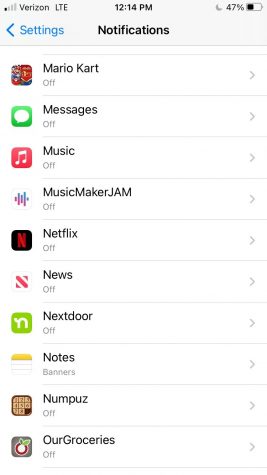Organizing Your Time
How to manage and use your time wisely, reduce screen time, and organize your schedule.
February 22, 2021
Time management is often overlooked and is essential if you want to maintain a healthy lifestyle and be efficient with your tasks. Here’s a basic breakdown of what you can do to improve your daily routine and be more efficient.
- Have your parents set a downtime for your phone. Section off time at night where you can’t get notifications or access your phone. I chose 9:30pm to 6:30am. I know that teenagers run best on eight hours of sleep. I gave myself an extra half an hour on each end so that I can get ready for bed, and get ready for school without distractions. Also set it so that you need a password for more time, and have only your parents know the code.
- Swipe left on group chats and hit the bell to silence it.
- Use app covers. These essentially cover up notifications on apps. Instead of having a red bubble above the app reminding you that you have texts, it can look like this (this is mine) or you can basically make it look like whatever you want.
- Turn your phone on silent and night mode. This will help because it will never go off, allowing you to not have your phone ring from across the room, or when having a conversation and want to check it. It limits distractions and allows you to feel less connected to your device.
- Turn off all notifications for everything except for call and reminders. But do turn off most things, including texting, email, social media, etc. If you want to keep something else on make sure it is only set to “Banners.” Do this by going to settings, click notifications then show previews “Never,” Then scroll through the notification style section and make sure everything is turned off, or set to banners. It should look something like this.

How to organize your schedule
- Never sign yourself up for something you don’t have time for.
- Write a list of everything you need to do, including sleep, get ready, school, any activities, meals, basically everything you would ever spend time doing. Then make two lists. List one: priorities and needs, this includes sleeping, school, meals, homework, etc. List number two: Afterwards – recreational tasks, this includes activities, time with friends, T.V. time, relaxation, etc.
- Take those two lists and make a timeline of an average week. Start off with sleep time, and make sure you get at least eight hours. Once that’s blocked off, add time of you getting ready, this being getting ready for school and getting ready for bed. I suggest timing all of your required things the day before you do this. Then add a length of time for lunch. But it doesn’t need to have a time set yet. Proceed to add everything from your priorities and needs lists. Then fill in the rest of the time with your favorite things from your optional list. This will show you an estimate of what you have time for in your daily schedule and what you may need to spend less time on. Try to follow the outlines of your planned week, but it’s just there to help you plan, be organized, and less stressed.
- Buy a planner and schedule events in advance and write down homework. Scheduling events in advance allows you to remember them and plan around them. Writing down homework not only helps you remember it, but it’s much more rewarding to cross through it when you’re done.
If you feel like it’s hard to organize your time because you are out of energy or have given up, consider this:
If you’re always feeling tired and unmotivated, try to get eight hours of sleep and eat healthier. It is easy to get caught up watching a new show and not get enough sleep as a result. To help, consider only starting a new show when you know you’re going to have time to finish it, or better yet, read a book before bed because it doesn’t have any blue light which can keep you up. Instead you could watch a little bit of a show you have already seen so it’s easier to pull yourself away and get some rest. I know that sounds hard, but the best thing to do in the case of eating healthy is limit the junk food in your house. Eat a healthy large meal before going to the grocery store, which will make you full and have no cravings while shopping for food. When you’re there, buy only healthy items. This will limit your cravings at home because if it’s out of sight, out of mind, it also makes it more difficult to get unhealthy food, and seems like high effort and low reward. It’s easier to grab a bag of chips from your pantry than to go out and buy it.









